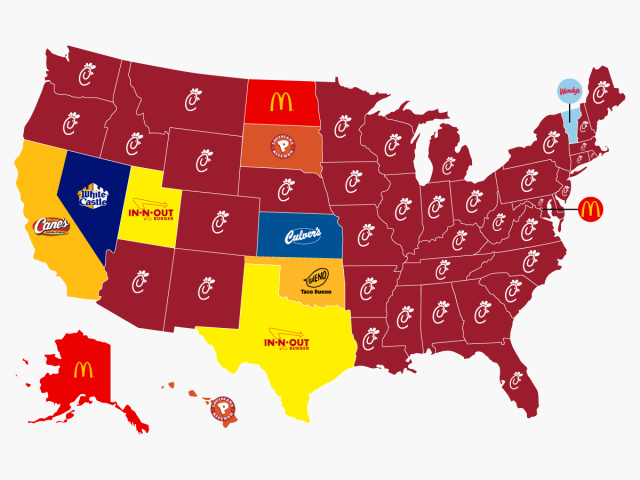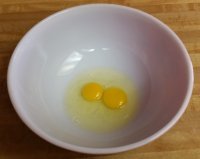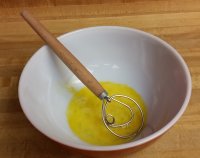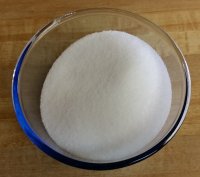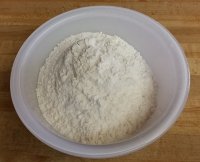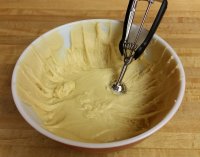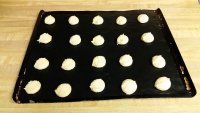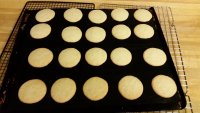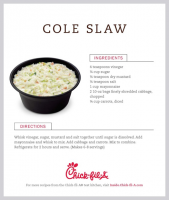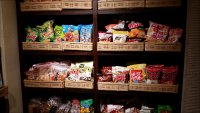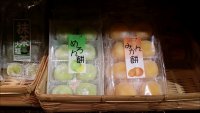I don't think of myself as a conformist. I mean, really, can you be of my generation and not like rock 'n' roll? I'm afraid I've always taken pride in being different from the general culture.
Apparently I'm slipping.
Lo and behold, my hands-down, absolute, nothing else is even close, favorite fast-food restaurant, Chick-fil-A, is the most popular fast-food restaurant in the country. Here's the state-by-state breakdown. (Click to enlarge.)
I suppose McDonalds, which won only Alaska, North Dakota, and Washington, D.C., could argue with the methodology, since they have so many restaurants.
For the study, we looked at which chains received the most visits on average in every state based on the total number of visits to each chain divided by the number of locations in that state.
But even McDonald's can't argue with these numbers.
Chick-fil-A dominates, which isn't surprising — the fried-chicken chain generates more revenue per restaurant than any other fast-food chain in the US.
I guess part of being independent of popular opinion means accepting the situation when other people agree with me. :)
Our children, who grew up in Mickey's Backyard, and whose favorite of all the Disney World parks was always EPCOT, may enjoy the memories evoked by this National Geographic article about the Netherlands: This Tiny Country Feeds the World. (Thanks, Eric, for tweeting this.)
In a potato field near the Netherlands’ border with Belgium, Dutch farmer Jacob van den Borne is seated in the cabin of an immense harvester before an instrument panel worthy of the starship Enterprise. From his perch 10 feet above the ground, he’s monitoring two drones—a driverless tractor roaming the fields and a quadcopter in the air—that provide detailed readings on soil chemistry, water content, nutrients, and growth, measuring the progress of every plant down to the individual potato. ... The global average yield of potatoes per acre is about nine tons. Van den Borne’s fields reliably produce more than 20.
Almost two decades ago, the Dutch made a national commitment to sustainable agriculture under the rallying cry “Twice as much food using half as many resources.” Since 2000, van den Borne and many of his fellow farmers have reduced dependence on water for key crops by as much as 90 percent. They’ve almost completely eliminated the use of chemical pesticides on plants in greenhouses, and since 2009 Dutch poultry and livestock producers have cut their use of antibiotics by as much as 60 percent.
Seen from the air, the Netherlands resembles no other major food producer—a fragmented patchwork of intensely cultivated fields, most of them tiny by agribusiness standards, punctuated by bustling cities and suburbs.
Climate-controlled farms enable a country located a scant thousand miles from the Arctic Circle to be a global leader in exports of a fair-weather fruit: the tomato. The Dutch are also the world’s top exporter of potatoes and onions and the second largest exporter of vegetables overall in terms of value.
The brain trust behind these astounding numbers is centered at Wageningen University & Research (WUR), located 50 miles southeast of Amsterdam. Widely regarded as the world’s top agricultural research institution, WUR is the nodal point of Food Valley, an expansive cluster of agricultural technology start-ups and experimental farms. ... Ernst van den Ende, managing director of WUR’s Plant Sciences Group, embodies Food Valley’s blended approach. A renowned scholar with the casual manner of a barista at a hip café, van den Ende is a world authority on plant pathology. But, he says, “I’m not simply a college dean. Half of me runs Plant Sciences, but the other half oversees nine separate business units involved in commercial contract research.” Only that mix, “the science-driven in tandem with the market-driven,” he maintains, “can meet the challenge that lies ahead.”
Could this be the start of a new, more sustainable, Green Revolution?
EPCOT has a new party: The International Festival of the Arts. We checked it out, and found it almost as much fun as their Food and Wine Festival. There was art, mostly with a Disney theme, and music, and other features, but our interest lay mainly in the culinary arts.
I do remember one painter, probably because his name was Noah. "Noah Fine Art" is his business, and I remarked that it's pretty amazing to be known only by your first name. When we came home, I did a Google search simply on "Noah art"—and his website was the first hit.
But as I said, food was our main interest. There was much more we could have eaten, but even sharing the already-small portions doesn't leave room (or budget) for everything.
From Pop Eats!: Sous Vide Venison with Butternut Squash Purée, Pomegranate Reduction, Pickled Turnip, and Juniper Berry Powder, followed by Almond Frangipane Cake layered with Raspberry Jam and Chocolate. The flavors worked together in an amazing way, and the venison was the best I've ever tasted. (Porter liked the venison he ate in New Zealand better, but I did not have any on that occasion.) The cake was even better than it looks. (As usual, you can click on the images for a bigger picture.)
From The Refreshment Cool Post: Chilled Shrimp, Quinoa, Layered Vegetables, Spiced Yogurt, and Red Pepper Coulis. I'm sorry I forgot to take a picture of this, because the presentation was totally not what I expected, and the taste was really good.
From The Painter's Palate: Trio of Savory Croissant Doughnuts—Whipped Herb Cream Cheese with Sea Salt, Chicken Mousse with Fresh Herbs & Everything Bagel Seasoning, and Spicy Tuna with Sriracha Mayonnaise and Sesame Seeds. These were good—the Spicy Tuna winning hands down—but messy to eat. I missed photographing this one, too; fortunately the picture was available in Disney's promotional materials.
From The Artist's Table: Callebaut Belgian Sipping Chocolate Flight: White, Milk, Dark. As you can see, I forgot to take this picture till we were well into this incredibly delicious trio. Even the white chocolate (my least favorite) was wonderful, the dark was the best, and the milk had caramel notes that made it spectacular.
It was a hot day (in the 80's and sunny) so a repeat-repeat visit to Japan for shaved ice was in order after we had put some space (and food) between it and the chocolate. This time we tried the rainbow flavor; it was good but tangerine is still the best, and it's still worth paying the extra buck to get the sweet milk topping.
Finally, and this has nothing to do with food but everything to do with amusing our grandchildren, or more likely their mothers. This was a wall decoration at Italy; I call it La Figmenta.
Cookies.
Back in 1992, a politician could cause a scandal by denigrating (whether intentionally or no) women who had chosen homemaking as their career: I suppose I could have stayed home and baked cookies and had teas, but what I decided to do was to fulfill my profession....
Be that as it may, my recent decision to spend a good deal of my free time baking cookies was not a political one. I just wanted to be able to bake a chewy cookie.
I love to bake, and have many cookie recipes that I pull out from time to time, but I wanted something different. Every once in a while I had tasted a chocolate chip cookie that was both soft and chewy, but not very often, and it was always from a commercial bakery. I wanted to be able to do it myself. I thought that would be simply a matter of searching online, where one can find a recipe for almost anything. And indeed, I found recipes that claimed to make chewy cookies, but they didn't turn out to be what I was looking for. So I pulled together the results of my research and started my Cookie Project.
I had one recipe in my collection, for ginger cookies, that came close to what I was looking for. That's where I started. I modified nearly every factor that could be changed, one after another, and in combination. I probably baked a couple thousand cookies. Fortunately, we didn't have to eat them all, finding plenty of willing volunteers to help out. Not that we didn't eat more than was strictly necessary ourselves. The great thing is that even the failures were delicious. I modified certain factors, such as the amount of baking soda, because I wanted a flatter cookie—but there was nothing wrong with the fluffier versions.
I am very, very happy with the results. The cookies are chewy exactly as I wanted them to be. Even the plain vanilla version tastes awesome. I've loved every variation I've made so far, and have many more ideas to try in the future. And making these cookies is super easy! I broke many of the baking rules that I grew up with: I melt the butter instead of creaming it (thanks, Heather!), I stir the dry ingredients together instead of sifting them, and I mix it all with a dough whisk instead of an electric mixer. I use a cookie scoop instead of two teaspoons to form the cookies, and instead of greasing my cookie sheets I line them with a Teflon sheet. I can whip up a batch of over 100 great-tasting cookies in less than an hour, most of which is cooking time, because with my oven I have to cook batches in series, not in parallel.
One thing I had to let go was healthfulness. I'm a big fan of making desserts more healthy: using whole wheat flour, cutting the amount of sugar, adding other grains and fruit. I make an oatmeal raisin cookie that tastes great and with a glass of milk provides a healthier breakfast than many cereals. But for this project my object was strictly to produce chewy cookies, so I did what I had to. After achieving the texture I wanted, I did try to reduce the sugar. The cookies still tasted plenty sweet—but the chewiness was gone. So there it is. Don't eat these cookies for your health. They're treats—eat responsibly.
What I gained most from this project, aside from wild success in the cookie department, was a better appreciation for what it takes to make progress on a project. You have to put in the time, you have to spend money on ingredients, you have to try and try and try again. You have to eat a lot of cookies. For my next project, I think I'll turn to bread....
- For a pdf version of the recipe, without pictures, click here.
- For a pdf version with the notes reduced in size so the whole thing fits on two pages, click here.
- For a one-page pdf version of the basic recipe, click here.
Chewy Cookies, Theme and Variations
The Theme (Chewy Vanilla Cookies)
2 eggs, beaten
1 tablespoon water
1 teaspoon vanilla extract
(for Variations, other flavorings to taste)
1 cup salted butter (2 U.S. sticks), melted
½ cup Karo light corn syrup
2 cups sugar
(for Variations, 1 – 2 cups add-ins)
3¾ cups all-purpose flour
1 teaspoon baking soda
½ teaspoon salt
In a large bowl, beat together the eggs, water, vanilla, melted butter, corn syrup, and sugar. (When making a Variation recipe, add other extracts and flavorings with the vanilla, and stir in the add-ins after the wet ingredients have been combined.)
Stir together the flour, baking soda, and salt. Add to wet ingredients and mix well. The dough will be sticky and quite moist.
Drop onto lined or ungreased cookie sheets, using about 2 teaspoons of dough per cookie. Bake at 325 degrees F for 7 to 9 minutes. Do not overbake. Allow cookies to sit for a few minutes out of the oven, then remove them to cooling racks. Store in air-tight containers when completely cool.
The cookies should be flat, textured, and amazingly chewy. They’re wonderful hot out of the oven, but even better the next day. For easy holiday cookies with a more festive look, sprinkle the unbaked cookies with sugar sprinkles of an appropriate color.
Notes
I like to save dishes by cracking the eggs directly into the bowl and beating them there before adding the other ingredients.
Because the butter is melted, this works quite well mixed by hand instead of with an electric mixer. I like to use a Danish dough whisk, adding the ingredients one or two at a time and mixing well after each addition. With an electric mixer, you might want to stir in any add-ins at the end, instead of with the wet ingredients.
If using unsalted butter, increase the salt to 1 teaspoon.
I melt the butter in the microwave, in a 2-cup glass measuring cup. I then can easily measure the corn syrup by adding it until the butter rises to the 1½ cup mark. This saves a dish, makes the syrup easier to pour out of the cup, and helps cool the butter. You don’t want the butter to be so hot it cooks the eggs.
The cookies look nicer if I line the pans with Swiss Teflon baking sheets. You could probably use parchment paper instead.
You can form the cookies the old-fashioned way, using two spoons, but I love my Oxo Good Grips cookie scoops for ease of use and consistency of cookie size I usually use the small (2 teaspoon) scoop, but the medium (1½ tablespoon) works well too; I just add a couple of minutes to the baking time. If I get the large (3 tablespoon) scoop that’s on my Christmas list, I’m going to make cookies big enough to use for homemade ice cream sandwiches….
When storing the cookies, I like to separate the layers—with parchment, plastic wrap, waxed paper, or whatever works for you. I find that coffee filters fit most of my containers perfectly. Otherwise, the cookies tend to stick together.
These cookies freeze very well. Sometimes I freeze them individually on a cookie sheet, then put them loosely in a plastic bag for storage. If you freeze them first, you don’t need to worry about them sticking together, and you can take out a few at a time, as you wish.
It also works great to make and freeze balls of dough for baking later. However, in our house, the frozen dough is likely to get eaten as-is before it has a chance to get into the oven.
The beauty of this recipe, besides that it produces delicious, chewy cookies, is its flexibility.
The Variations
Substitutions
Water The amount of water can be altered as needed, but the recipe is fairly forgiving and 1 tablespoon seems to work well despite variations in the amount of liquid extracts used.
Vanilla I use vanilla in every recipe, even when adding other flavorings or extracts.
Salted butter Unsalted butter works just as well if you increase to 1 teaspoon the salt added with the dry ingredients.
Karo corn syrup This is not the much-maligned high fructose corn syrup, which has had some of its glucose converted to fructose. Other brands of corn syrup may contain some HFCS, but not Karo. The light corn syrup has some added salt and vanilla, but not enough to worry about when you’re making substitutions. If you want the flavor and don’t mind the price, you can substitute honey or molasses (not blackstrap). I think corn syrup is hard to find in Switzerland, but there’s probably some version of glucose syrup or golden syrup that will do. I haven’t tried maple syrup yet, but I think it would be delicious.
Sugar Use white or brown sugar according to your taste. I use white sugar for the lightly-flavored cookies, and dark brown sugar for the rest.
Add-ins The sky’s the limit.
All-purpose flour In my baking, I often like to substitute white whole wheat flour for some or all of the all-purpose, but I haven’t yet experimented much with that for this recipe. First things first.
Variations on the Theme
Chewy Chocolate Chip Cookies Use brown sugar, with chocolate chips (large, small, dark, milk, whatever) as the add-in. Don’t skimp on quality when it comes to the chips! My favorites are Ghirardelli and Guittard.
Chewy Double Chocolate Chip Cookies Use the Chocolate Chip recipe but with 1/4 cup cocoa in place of an equal amount of the flour. I prefer Black Cocoa from King Arthur Flour.
Chewy Mint Chocolate Chip Cookies Use the Double Chocolate Chip recipe and add peppermint extract to taste.
Chewy Hazelnut Chocolate Chip Cookies Use the Double Chocolate recipe, adding hazelnut flavoring to taste. Think Nutella….
Chewy Mocha Chocolate Chip Cookies Use the Double Chocolate recipe, but replace the water with extra-strong coffee. (Or use espresso powder. I love this, but find it has a tendency to clump into a very solid rock after being opened.)
Chewy M&M Cookies Use either the Chocolate Chip or the Double Chocolate Chip recipe, but with M&M’s instead of the chips. I prefer the mini M&M’s. Our chldren's choir went wild over this.
Chewy Butter Crunch Chocolate Chip Cookies Use the Chocolate Chip recipe but make the add-in half chocolate chips (I prefer the minis for this one) and half Heath English Toffee Bits (or use leftover crumbs from making Almond Butter Crunch candy).
Chewy S’more Cookies Just like the Butter Crunch Chocolate Chip recipe, but use small marshmallows instead of the Toffee Bits. For larger cookies, cut-up mini marshmallows might give a better texture; for my small cookies, I used Kraft Marshmallow Bits.
Chewy Lemon and Honey Cookies Substitute honey for the corn syrup in the Vanilla recipe, and add lemon peel (fresh or dried) and/or Boyajian lemon oil (also available at King Arthur Flour) to taste, with the liquid ingredients. I like to add a little yellow food coloring, too.
Chewy Strawberry Lemon Cookies Add cut up dried strawberries to the Lemon and Honey recipe.
Chewy Almond Cherry Cookies Use the Vanilla recipe, adding almond extract to taste (I use at least 1 tablespoon), and dried cherries.
Chewy Cranberry Tangerine Cookies Use the Vanilla recipe, with dried cranberries as the add-in and tangerine (or orange) extract to taste. I used tangerine because I happen to have some tangerine extract, but when that’s gone I’ll use Boyajian orange oil.
Chewy Gum Drop Cookies Use the Vanilla recipe and add cut-up gum drops. I like to use the spice drops and cut them in thirds or quarters. This can get a bit sticky and tedious, but is worth it. This is a variation people seem to have strong feelings about, pro and con. For me, it was a successful attempt to recreate the best of a long-lost recipe my mother used to make on rare occasions. I absolutely loved to taste the dough, up until the point where she added coconut, at which time the cookie was ruined as far as I was concerned. You are welcome to use coconut as an add-in for your own cookies.
Chewy Gummy Worm Cookies Like the Gum Drop variation—but with a different flavor. Cutting up gummy worms is a lot easier than cutting up gum drops.
Chewy Speculaas Cookies Use the Vanilla recipe with brown sugar, and mix Speculaas Spice in with the dry ingredients. (When I can’t get it from Switzerland, I buy mine at King Arthur Flour.) If you believe speculaas cookies should always be crispy and in windmill shapes, think of these as Biscoff cookies. Using one tablespoon of the spice mix gives a strongly-flavored result that tastes more like traditional speculaas cookies; using less might more closely approximate the Biscoff flavor.
This time we tried a few new things, but made a point of revisiting some favorites.
Continuing from Part 1 and Part 2:
FOURTH VISIT
Greenhouse Guru Mini San Marzano Tomatoes. Almost everything at the Festival is overpriced, but this is the only one I'd call an out-and-out ripoff. I was hoping for something fresh and tasty, you know, like a real tomato. This was a small bag of the kind of tomatoes I can get any day (for a much better price) at Publix. On top of that, they had been refrigerated.
Chocolate Studio Ghirardelli Chocolate Raspberry Torte. It was every bit as good as it sounds.
Canada "Le Cellier" Wild Mushroom Beef Filet Mignon with Truffle-Butter Sauce. One of my favorites. You have to special order if you want it to be cooked rare, but it's worth it. PLUS, I had gone ahead to grab a table, and when Porter found me he was bringing not only the filet but a small cup of hideously expensive but delicious apple ice wine. He was spoiling me....
France Boeuf Bourguignon: Cabernet Sauvignon-braised short Ribs with Mashed Potatoes, AND Soupe à l'oignon au Gruyère et Cognac. Old favorites that are too good not to indulge in both.
Belgium Belgian Waffle with Berry Compote and Whipped Cream. Another well-worthwhile repeat.
Craft Beers Piggy Wings: Fried Pork Wings with Korean BBQ Sauce and Sesame Seeds. This must be what you get when pigs fly. The pork was small, fatty, and bony (like a true wing), but the barbecue sauce was good.
China Sichuan Spicy Chicken. Everything at the Chinese kiosk sounded delicious, but I remembered how good the chicken was. If we return before the Festival is over, maybe we'll try something different.
We also visited the Ghirardelli booth twice this time. It's a little disappointing that the sample chocolate square is always milk chocolate caramel instead of a chance to taste more of their many, different, delicious varieties, but it's hard to complain about chocolate caramel.
For all the times we've visited EPCOT, we'd never done the Soarin' Around the World ride, so we remedied that deficiency. In contrast to most of the new rides at the theme parks around here—and despite the dire "lawyer warnings"—Soarin' does not bounce you around and slam you into the sides of the car. It only lifts you a bit into the air; the awesome effects are all from the movie that nearly surrounds you. Nor did it make us queasy at all, though it was nearly impossible to avoid flinching at some of the apparent close calls as we soared around the world, from the Matterhorn to Sydney Harbour to the mighty Iguazú Falls. You can see the ride, sans special effects (which included scents), here.
But my absolutely favorite was the one before Cronkite's. I can find no video online (this was in the early 80's, after all), but you can see some pictures and most of the text at Walt Dated World. I've extracted the text below so you can compare the language with the prosaic (boring) lecture-style of today.
Narrator: Where have we come from, where are we going? The answers begin in our past. In the dust from which we were formed, answers recorded on the walls of time. So let us journey into that past, to seek those walls, to know ourselves and to probe the destiny of our Spaceship Earth.
Narrator: Now, suns reverse, moons re-phase, let us return to ancient caves where first we learn to share our thoughts-and to survive.
Narrator: Where are we now? It is the waiting dawn where vast things stir and breathe. And with our first words and first steps, we draw together to conquer the mammoth beast. It is the dawn of a new beginning, the dawn of recorded time.
Narrator: On cave walls we inscribe our greatest triumphs, a growing record of our deeds, to share with others so they too may greet tomorrow's sun.
Narrator: Ages pass and more walls rise in the valley of the Nile. Man-made walls of hieroglyphics. Then with new symbols, we unlock our thoughts from chiseled walls and send them forth on papyrus scrolls.
Narrator: On fine Phoenician ships, we take our scrolls to sea. Real scrolls simplified by an alphabet, eagerly shared at distant ports of call.
Narrator: Deep in the shadows of Mount Olympus, our alphabet takes route, flowering with new expression. Hail the proud Greeks: Aeschylus, Sophocles, Euripides. The theater is born.
Narrator: North, south, east, and west, all roads lead from Rome, a mighty network reaching across the land, welding far-flung garrisons into a growing empire.
Narrator: Glorious Rome, until consumed by the flames of excess. Imperial Rome, lost in the ashes of darkness.
Narrator: Far from the dying embers, Islamic wise men preserve ancient wisdom and weave a rich network of new knowledge linking east and west.
Narrator: In western abbeys, monks toil endlessly transcribing ancient wisdom into hand-penned books of revelation.
Narrator: At last! A new dawn emerges. The dawn of the Renaissance-and a wondrous machine performs as a thousand scribes. Now for all: the printed word.
Narrator: Our books fuel the fires of the Renaissance. It is a time to discover anew the worlds of poetry and philosophy, science and music. As our minds soar, our hands find new expression in the flourishing world of art. Behold, the majesty of the Sistine ceiling.
Narrator: The Renaissance: a beacon through the mists of time, guiding us to a new era. A time of invention and exploding communication.
Narrator: With each day come more paths, more ideas, more dreams, and we build new machines: computer machines that think, that store, sift, sort, and count, that help us chart our course through an age of boundless information.
Narrator: With these machines comes a wondrous new network of communications, a vibrant maze of billions of electronic pathways stretching to the very edge of space.
Narrator: Poised on the threshold of infinity, we see our world as it truly is: small, silent, fragile, alive, a drifting island in the midnight sky. It is our spaceship. Our Spaceship Earth.
Narrator: Now our Future World draws near -and we face the challenge of tomorrow. We must return and take command of our Spaceship Earth. To become captains of our own destiny. To reach out and fulfill our dreams.
Woman: GPC report. Odyssey is complete with position home.
Man: Can you switch to manual payload?
Woman: No problem. Manuel payload is activated. Signal from command execution.
Man: Roger. Are you getting video?
Woman: Affirmative. Delta camera is on and tracking.
Narrator: Our journey has been long. From primal caves we have ventured forth traveling the endless corridors of time seeking answers to our tomorrow. With growing knowledge and growing communication, we have changed our lives, changed our world.
Narrator: From the reaches of space to the depths of the sea, we have spun a vast electronic network linking ourselves as fellow passengers together, on Spaceship Earth.
(Ride vehicles pass by several TV screens.)
Narrator: Today our search for understanding is unbounded by space and time. Vast stores of information, knowledge from everywhere, standing ready at our beck and call to reach us in an instant. With our great network, we harness our knowledge, give it shape and form to serve us, to help create and communicate a better awareness of ourselves, and our world.
Narrator: Ours is the age of knowledge, the age of choice and opportunity.
Narrator: Tomorrow's world approaches, so let us listen and learn, let us explore and question and understand. Let us go forth and discover the wisdom to guide great Spaceship Earth through the uncharted seas of the future. Let us dare to fulfill our destiny.
One of the perks of having an annual Disney pass is the ability to make the spontaneously suggestion, "Do you want to go to EPCOT for lunch?"
Continuing from our list of food experiences,
THIRD VISIT
New Zealand Steamed Green-Lipped Mussels with Garlic Butter and Toasted Breadcrumbs, and Seared Venison Loin with Wild Mushroom Marsala Sauce and Kumara Dumpling. I passed on the mussels, but Porter said they were delicious. The venison was as well, though he said it was not as good as the venison he had in New Zealand itself, being less flavorful. Most of the food at Disney is made more bland than it should be.
Australia Grilled Sweet and Spicy Bush Berry Shrimp with Pineapple, Pepper, Onion and Snap Peas. Good, with more spice than I've come to expect from Disney, probably too much for our friends who like their food mild.
China Sichuan Spicy Chicken. Delicious! Definitely too spicy for our friends who prefer their food mild.
South Korea Korean-style BBQ Beef with Steamed Rice and Cucumber Kimchi. Good, but nothing special, and far too mild. I would have said the salad was cucumber slices with a dash of vinegar—hardly kimchi.
Japan The shaved ice is becoming a tradition. Because we've had the tangerine flavor twice, we tried cherry this time. Good, but tangerine is still the best. Of cousre we had the sweet milk sauce; I need to figure out how to make that at home.
Belgium Belgian Waffle with Berry Compote and Whipped Cream. Delicious! Surprisingly, the concoction was not too sweet, which made it delightful.
Morocco Kefta Pocket: Seasoned Ground Beef in a Pita Pocket. Very good.
France Boeuf Bourguignon: Cabernet Sauvignon-braised short Ribs with Mashed Potatoes. Porter voted this even better than Canada's Filet Mignon (see previous post). Good as it was, I disagreed, and had planned to reassure myself on that point, but...
Canada Canadian Cheddar Cheese Soup served with a Pretzel Roll. By the time we had eaten our way to Canada, I was too full to appreciate the filet, so we chose the bacon-y cheddar soup instead. It was very good, but next time I'm saving room for the beef.
As we made our way to the park's exit, we stopped by the Festival Center's Ghirardelli booth to top off our meal with some complimentary chocolate.
We're not finished, I hope, with our visits to EPCOT's Food and Wine Festival, but someone asked which were our favorites, so I'll make my answer into a review, albeit one that will need updating.
This annual event at EPCOT is not for the epicure who can find cheaper and more authentic ethnic food nearby. This is Disney, after all, and thus the food is more Americanized that we would like. But for us—living here and having annual passes—it's a delightful way to enjoy many little tastes of different foods. Not having to pay for admission and parking makes us feel more free to spend what amounts to a lot of money for the quantity of food consumed.
Our procedure for getting the most out of our tasting experience is to order one item at a time from each kiosk, and share it. The portions are very small, so we can eat from many countries before running out of appetite. At those prices ($4-$8 per taste) there's no temptation to eat when we can't truly appreciate the food.
So far there has been nothing we didn't like, though some dishes were more impressive than others. In the list below, assume we liked it unless I note otherwise. If it was really special, I'll note that, too.
FIRST VISIT
Ireland Irish Cheese Selection Plate: Irish Cheddar, Dubliner, and Irish Porter.
Belgium Beer-braised Beef served with Smoked Gouda Mashed Potatoes.
Japan Tangerine shaved ice with sweet milk topping. It's basically a glorified snow cone, but delicious and just right for a hot day. The "sweet milk" topping costs an extra dollar, but is the reason we bought this in the first place, having fallen in love with sweet milk ice cream on our visit to the real Japan.
SECOND VISIT
Hawai'i Spicy Tuna Poke with Seaweed Salad and Nori Rice. It left me craving one of those big chunks of raw tuna they celebrate with in Japan.
Canada "Le Cellier" Wild Mushroom Beef Filet Mignon with Truffle-Butter Sauce. The beef was delicious and tender, though hardly the "rare" we were told it would be. The wild mushrooms and the truffle butter were fantastic.
France Soupe à l'oignon au Gruyère et Cognac. Awesome. We're coming back for this a second time, though all of the offerings at France look delicious and will need to be sampled.
Brazil Pão de Queijo (Brazilian Cheese Bread). Okay, but not worth buying again. The bread was good, but the cheese bland.
Belgium Belgian Waffle with Berry Compote and Whipped Cream. Delicious! Surprisingly, the concoction was not too sweet, which made it delightful.
Morocco Spicy Hummus Fries with Cucumber, Tomato, Onions, and Tzatziki Sauce. It seems disingenuous to call these "fries." "Fried hummus" would have been more accurate. But they were good. Morocco is always one of our favorite places to eat at EPCOT.
Japan Reprise of the tangerine shaved ice with sweet milk sauce. The days are still hot in Florida. There are other flavors, but the tangerine is so good....
We travelled counterclockwise around World Showcase, but stopped eating mid-way around. We'll have to go the other way next time, and catch the many countries we had to walk reluctantly past.
We did, however, stop at the Festival Center on our way out of the park, for the free samples of Ghirardelli chocolate.
Now I'm hungry just writing about it.
I did it.
I made chocolate chip cookies the other day.
Most of the dough made it to its intended destination: a plate of warm, soft, golden-brown cookies oozing 60% cacao chocolate chips.
But, I confess, quite a bit of the dough was devoured without ever having come near the oven. What's more, I did what I often do: stuck several cookie dough balls in the freezer—not for later baking, but because, really, frozen cookie dough is sometimes better than the cookies themselves.
Big Brother, in the form of the FDA and other health watchdogs, has been fussing at us for years not to eat raw cookie dough and cake batter because of the minuscule risk that the eggs might be carrying salmonella. Now, thanks to a contaminated batch of General Mills flour, they've upped the threat level: now that pleasure is considered doubly risky, because of the raw flour. So I suppose this means raw bread and biscuit doughs are out, too.
Not for me. I took my better-than-average-sourced eggs and my King Arthur flour and made those cookies. They were delicious, both raw and cooked.
I wish the FDA would spend less time drawing ever-narrowing circles around what we can eat, and more time investigating and improving whatever processes are contributing to food contamination. We don't need to stop consuming raw cookie dough, rare meat, and unpasteurized milk, orange juice, and cider—we need food suppliers whose practices keep our food from becoming contaminated in the first place.
It's a risk, and it's not for everyone. To each his own. I doubt I'll ever go skydiving, and climbing Mt. Everest is not on my bucket list. But I'm with Lenore Skenazy on this one.
I just read an interesting article entitled, "I Didn’t Let My Kids Snack for a Week. Here’s What Happened." It reminded me again of my puzzlement over how we got to the point of believing that children can't go a few hours without food. I've always seen that attitude as a problem. A First World problem, to be sure, but still a strange and annoying problem.
It's true that my childhood was in the dim past, but I'm certain that snacks were few and far between. Yes, there was sometimes a glass of milk and cookies when I came home from school (really!), while my mother crafted dinner and we talked about my day. But generally we reserved eating for mealtime: breakfast, lunch, and dinner. Eating between meals was frowned upon for many reasons: expense, mess to clean up, and above all, it would "spoil your dinner." Kids were expected to be hungry when they came to the table; it made us less likely to complain about the food.
When our own children came along, we pretty much continued the policy, but already society was starting to change. Soon you couldn't have an outside activity—from sports practices to Sunday school classes—without snacks. Parents began to feel abusive if they didn't offer food every time their children whined, "I'm h-u-n-g-r-y!" I don't think the increase in the number of children who are picky eaters is coincidental.
Spoiler Alert: So what happened when the author restricted snacking? Win-win-win.
I’m definitely going to continue feeding my family in this way. They ate a great variety of foods, and our time at the table together was actually enjoyable.
I didn’t spend it nagging, and they didn’t spend it whining. They arrived to the table hungry, and they ate. My house is cleaner, my kids are happier, and I feel way more in control.
My children have less [sic] meltdowns because they are better nourished. And I have fewer meltdowns because there are fewer demands on me.
I'm not against all snacking. I like snacks myself. Too much. But when it deprives children of the right to be hungry enough to appreciate good food, eaten at the table with family—there's a problem.
 Yesterday was the first day of EPCOT's Flower and Garden Festival for 2016, and we were there to celebrate its opening. As always, the flower displays were wonderful, and the portable butterfly garden was fun.
Yesterday was the first day of EPCOT's Flower and Garden Festival for 2016, and we were there to celebrate its opening. As always, the flower displays were wonderful, and the portable butterfly garden was fun.
The only "ride" we bothered with this time was Impressions de France, the wonderful tour of the country accompanied by even more wonderful music by French composers. This film is one of the few parts of EPCOT that remains unchanged, and since we both agree that few of the changes have been for the better, the French pavillion has become an EPCOT "must do" for us, as Dr. Doom's Fearfall is at Universal.
You never know, with YouTube videos, when some official is going to decide one violates something-or-other and take it down, but for now, at least, you can see an excellent production by Martin Smith of his visit there in 2011. I trust Disney World recognizes it for what it is: a longer commercial for EPCOT than they could ever get away with.
Our Disney disappointment came with lunch, which we had intended to enjoy at Norway in World Showcase. Norway used to be one of our favorite stops because of the Maelstrom ride, which sadly is now closed in preparation for being replaced by something based on the movie, Frozen. Oh, how I miss the days when the company abided by Walt Disney's admonition that EPCOT should remain completely separate from the movie characters!
As it turns out, there is now no reason at all to visit the Norway site. The Akershus restaurant, where we had intended to eat, has been turned into a "Princess Storybook Dining" event, exclusively. We were greatly disappointed, as the delicious and authentic Scandinavian fare was something we were looking forward to when we sprang for annual park passes for the first time in many years. But we declined the experience, on the grounds that if we were going to spend over $50 per person for a meal, (1) we did not want a "Disney Princess experience," and (2) we wanted better food than we could expect from a restaurant whose primary audience is now children. Apparently the only other hope for Scandinavian food in Central Florida is IKEA, so you know what a blow this was.
It was hard to stay sad for long, however, since as part of the Flower and Garden Festival they have set up many additional food kiosks, in the manner of the Food and Wine Festival, and we enjoyed some good Moroccan snacks followed by a lemon scone with crème fraîche and blueberries.
My grandparents lived in Daytona Beach all their adult lives. Both arrived in 1915; my grandfather was originally from Western Pennsylvania, and my grandmother from West Virginia. My great-grandparents, John Stansbury Barbe and Minerva (Kemp) Barbe (Minnie) were very active in Daytona Beach: She was a hotel owner and busy with all sorts of community affairs, from business to politics to schools, and he was at one point mayor of the Town of Daytona Beach (before it became a city).
My grandmother ran the hotel for a while, but by the time I knew her had retired from the business and was living in my favorite place in all of Daytona Beach: 431 North Grandview Avenue. Sadly, both the house—now a business—and the neighborhood have changed, but at least the building's still there.
What more could a child want? It was a big house with lots of places to explore, a cellar that was sometimes visited by poisonous snakes, a picnic table and my grandmother's amazing flowers in the back yard, and an outdoor shower that we sometimes shared with lizards. (Living in Florida myself now, lizards are commonplace. But they were an exotic treat for a child who lived in upstate New York and only visited every other year.)
Why the outdoor shower? Not because there were no indoor facilities, but because the house was a mere two blocks from the ocean and the incredible beach; the shower was an easy way to wash off the sand and salt from our frequent swims before entering the house. It was also an easy walk from my grandparents' home to the Bandshell and Broadwalk (not "boardwalk"). As a child I was completely oblivious to the seamier side of life in Daytona Beach, though I understand now why we were never allowed to go to the Broadwalk without an adult.
Then there were the people. My Florida relatives were different from most of the folks I knew back home, which thanks to the presence of General Electric, had a higher-than-normal population of engineers and other intellectuals. My grandfather had worked for the Post Office and retained an intense interest in collecting stamps—if only I had managed to figure out how to enjoy his enthusiasm without feeling obliged to share it! My uncle was a fisherman, and I loved it when he'd let us fish with him off the Pier. My cousins were much older than I, and therefore very cool, especially the one that could be counted on to do dangerous things like set off firecrackers in the backyard (not sure how my grandparents felt about that...), and the one who was at first a lifeguard (very high coolness factor to a young girl) and eventually worked for NASA in exotic places like Grand Turk Island and could tell us stories about the astronauts (even higher coolness factor to a young nerd).
Because of their former hotel business, my grandparents had made friends from all over who still came to visit them. They even had a maid who came occasionally to help with the housework—no one else of my acquaintance had a maid—and what's more, the maid was black, which made her even more exotic than the lizards to one who was growing up in a town where "cultural differences" meant that some of your friends' parents might have come from Italy or Poland. I wish I had been more curious as a child to hear the stories of all these different people.
My grandmother was a wonderful cook, especially when she was cooking fish that had been caught just hours earlier, and most especially if they were fish that I had caught. We hardly ever ate at restaurants—in those days few ordinary people ate out, even if their grandmothers weren't good cooks. But when we did, for special occasions, more often than not it was at a place called Kay's, at 734 Main Street. It was a "family restaurant" with what you might call ordinary American fare, though my taste buds recall their fish as anything but ordinary. And definitely on the extraordinary side was a drink they called a Tiny Tim. When I knew it, the restaurant had Dickens-era decor, and one of their specialty mixed drinks they called a "Dickens." The Tiny Tim was a non-alcoholic version of the Dickens.
We all liked the Tiny Tim so much that we had it whenever we could, and eventually I begged the bartender to give me the recipe:
- 2 packages Bartender's Lemon Mix
- 4 packages Bartender's Lime Mix
- 1 package Bartender's Coconut Mix
- 3 gallons water
- 3 quarts pineapple juice
- 1 quart orange juice
- 1/3 quart lime juice
- 2 small cans grapefruit juice
- 1/2 quart cherry juice
- grenadine for color
Unfortunately, that didn't help much, though I'm sure it was only because I didn't try hard enough to find the ingredients that were not readily available at the grocery store. It occurs to me that all my efforts were BI (Before the Internet). Maybe I should try again. Anyway, I'm putting the recipe online for anyone who wants to check it out. I'm not hurting Kay's by giving away trade secrets: sadly, the restaurant went out of business, thanks in part to the neighborhood's change from family-oriented to one that catered to bikers and other tourists.
All these memories were triggered by a lunch at the Cheesecake Factory. There, Porter ordered their Frozen Iced Mango drink: "Mango, Tropical Juices and a Hint of Coconut Blended with Ice and Swirled with Raspberry Puree." It came with a strawberry, a slice of lime, and a slice of lemon as well, which may explain why despite the different ingredient list, it tasted more like a Tiny Tim than anything I've had in years. Whatever it was, next time we visit the Cheesecake Factory (which seems to be about once a year), that's what I'm ordering to go with my Avocado Egg Rolls, which is the reason for going to TCF in the first place.
At Thanksgiving, my sister (thank you!) alerted me to the massive fraud going on in the olive oil business. I did a bit of investigating, and discovered a few things I knew, and a few I didn't. Since I've only recently come to appreciate extra virgin olive oil (EVOO), I don't know much, though from research into other products (such as honey) I know that "made in..." or "imported from..." on the label doesn't necessarily tell you the source of the important ingredients.
I didn't know that when buying EVOO you should look for a harvest date on the bottle. Not a "best buy" date, but a harvest date. I'm so used to super-processed oils that I didn't think about olives as fruit, and the importance of freshness to minimally-processed oil. Then I noticed that the bottle of EVOO in my pantry had no harvest date at all.
I'm still using oil from that bottle, hoping its likely adulteration won't poison me. But I did find a brand in the grocery store that not only has the date, but is more local as well, being from California. We'll see how it tastes—not that my palate is good enough at this point to tell the fake from the real thing. But it is one of the brands that passed the test (California Olive Ranch).
Last night a 60 Minutes report confirmed the problem and provided a credible explanation: the Italian Mafia has found a lucrative, legitimate business they can leverage by nefarious means into huge profits. Nor is olive oil the only food they have their dirty fingers in. The show is definitely worth watching (under 15 minutes), if only to see the olive oil experts testing the wares. But if you're in a hurry, you can read the transcript. And here's an extra that was not part of the show: How To Buy Olive Oil.
Ohh, looking at that bread drizzled with fresh olive oil ... now I'm hungry.
It's no secret I love Chick-fil-A. I've never worked there myself, but friends who did in high school found it a good, supportive place to work.
I love that they are successful while maintaining their Sundays-off policy, even though I'm frequently frustrated on road trips because Chick-fil-A is my favorite fast food restaurant and we're often travelling on a Sunday. If Chick-fil-A can do it, more companies could if they tried: I grew up with most businesses closed on Sundays, and that's still the case in Switzerland, where store hours are much shorter than here. You learn to adjust.
These things wouldn't matter much if the food weren't good, but their Spicy Chicken Sandwich and Spicy Chicken Biscuit are the best I've had anywhere—and that's not for want of trying elsewhere.
If I've ever tried their cole slaw, I don't remember it, which may be part of the reason they're taking it off the menu. But some people like it as much as I like their spicy sandwiches, so I'm pleased to report that the company has done something else right: When they announced the end of cole slaw as an option at their restaurants, they published their recipe, so we can make it at home. (Click to enlarge.)
I wish other companies would do the same when discontinuing products.
This year we splurged and purchased annual passes to Disney World—for the first time since we moved to Central Florida over 30 years ago. Back then, with two very young children (four and not-yet-two), the reason was to free ourselves from the pressure to drive our kids hard in order not to "waste" any of the very expensive day at the park. What was our excuse this time? Beats me, but we're enjoying it. Porter's retirement frees us to visit the parks on our own schedule, and his annual pass provides free parking. (Mine is a lesser, cheaper version, but what need have we for two parking passes?) When parking is $20, it's a deterrent to casual visits.
All that to say: for a year, we can go to Morocco for dinner. Or China. Or Norway. For our first trip, we chose EPCOT's Marrakesh Restaurant, always one of our favorites. Then we stopped by Japan; we didn't buy anything, but admired a lot. We didn't buy any funnel cakes, either. Pictures bring memories of good times but no additional calories. :) You can click on the images to enlarge the photos, but please don't drool on your keyboards.
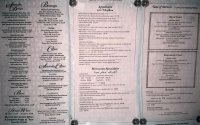 Beef brewat rolls, chicken bastilla, Jasmine salad...and bastilla for dessert
Beef brewat rolls, chicken bastilla, Jasmine salad...and bastilla for dessert
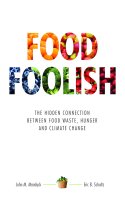 Food Foolish: The Hidden Connection Between Food Waste, Hunger and Climate Change by John M. Mandyck and Eric B. Schultz (Carrier Corporation, 2015)
Food Foolish: The Hidden Connection Between Food Waste, Hunger and Climate Change by John M. Mandyck and Eric B. Schultz (Carrier Corporation, 2015)
Have you ever heard of a cold chain? Me, neither. Yet we have depended on cold chains all our lives. If you don't drink your milk as it comes from the cow, then your life depends its being kept cold, whether it goes straight from the cow to your refrigerator, or travels thousands of miles in a refrigerated truck before being placed in the refrigerated dairy section of your grocery store. That vaccine your child just received? Useless, if it hasn't been kept sufficiently cool on its way from the manufacturer. Unless they're kept cool, fruits and vegetables start rotting the moment they're picked, losing flavor and nutrition, eventually becoming unusable.
The cold chain explains why the Carrier Corporation published Food Foolish. Keeping things cool is their business, and they've made it their business to develop sustainable technologies to do so. Along the way, they discovered a shocking truth: At least a third of all the food we produce in a year is never eaten.
The impact of food waste on hunger, climate change, natural resources and food security is enormous. It's changing the way we think about our product and technology development. It's strengthening our commitment to sustainable innovation. It's also prompting us to convene research and food chain experts to find solutions. We believe that food waste is an issue that must be elevated and examined globally. That's why we published Food Foolish. It's not an attempt to be the final word on the topic of food waste. Rather, it's meant to connect the issues of hunger, resource conservation and climate mitigation. We hope it will be a catalyst for more meaningful global dialogue which, many think, is essential to the sustainability of the planet.
That's why Carrier published the book. What do the authors say about why they wrote it?
Hunger, food security, climate emissions and water shortages are anything but foolish topics. The way we systematically waste food in the face of these challenges, however, is one of humankind's unintended but most foolish practices. We wrote this book to call attention to the extraordinary social and environmental opportunities created by wasting less food. We are optimistic that real solutions to feeding the world and preserving its resources can be unlocked in the context of mitigating climate change.
Food Foolish is a small book (182 pages) but very powerful. We're reasonably conservationist-minded around here, having been brought up that way. I feel pretty good that we put very little trash out on solid-waste pickup day, and the reason there's not usually much in our recycling bins is that we consume far less soda and beer than average. We take short showers and are in other ways mindful of our water use. Except for animal products, almost all of our food waste goes to feed our composting worms.
Ah. Our food waste. That broccoli that got shoved to the back of the refrigerator and forgotten? It fed the worms, so it's all good. Or maybe not....
When we consider ways to protect our fragile water resources, we need to look first and foremost at the global food supply chain. California provides one good example. The state produces nearly half of all U.S. fruits, vegetables and nuts from the very areas hardest hit by drought. Monterey County alone produces about half of the country's lettuce and broccoli.
Now imagine a consumer rummaging around in the back of his refrigerator's vegetable drawer only to find a forgotten head of broccoli, now yellow and unappetizing. He drops it in the trash. No big deal, right?
But wait: Fresh broccoli is about 91 percent water, and that's just the start. It actually takes a farmer about 5.4 gallons of water to grow that single head of broccoli. Just as each food product has an embedded carbon footprint, it also has a quantity of embedded freshwater from its journey along the food supply chain. In fact, a single person blessed with a healthy, nutritious diet will drink up to a gallon of water per day but "eat" up to 1,300 gallons of embedded freshwater in his food.
This little book stuck a sharp pin in my pride. Sure, it's better that the worms ate our spoiled broccoli than if it had gone into the landfill. But it was still a terrible waste. There's a lot more cost to producing food than what we see at the cash register. Water, fertilizer, pesticides, depletion of the soil, labor, storage, transportation—the human and environmental costs of that head of broccoli make it far too costly to become mere worm food.
Food waste also has a devastating impact on the environment. The water used to grow just the food we discard is greater than the water used by any single nation in the world.
[I]f food waste were a country by itself, it would be the third largest emitter of greenhouse gases behind China and the United states. Yet the connection between food waste and climate change is missing from policy discussions and public discourse.
Throughout history, human ingenuity has consistently foiled those who prophecy imminent doom in the form of mass starvation. Thomas Malthus (in 1798) and Paul Ehrlich (in 1968) both assured us that population growth inevitably leads to massive famine. Ehrlich specifically predicted that no matter what we tried to do about it, hundreds of millions of people were going to starve to death in the 1970's.
Fortunately, both Malthus and Ehrlich were wrong. Since The Population Bomb was published in 1968, the world's population has doubled to over 7 billion people. Despite this increase, humankind has managed to grow its food supply faster than its population. Eighty percent of the victims of famine in the last century died before 1965. Since the mid-20th century, famine has been more a function of civil disruption than of limited food supply.
The Green Revolution spiked Ehrlich's misanthropic guns, but the concern is back, and with reason. Dependent as it is on oil-based fertilizer, irrigation, and monoculture crop farming, the Green Revolution in its original form is not sustainable. A different kind of agricultural revolution is needed.
The political will exists to improve upon the gains of the Green Revolution, bu the landscape has changed. While the focus remains on alleviating chronic hunger, there has emerged a fundamental understanding that simply expanding farmland and improving crop yields are insufficient to feed a growing planet. Any new solution must be sustainable. ... Observers agree that if humankind wants to engineer a new "miracle" to help feed our growing planet, it must be fundamentally different in shape and substance from the Green Revolution of the 20th century.
Enter food waste awareness. By the numbers, if we could eliminate food loss altogether, we could increase our food supply by 50 percent! In the real world, complications must enter the equation; even so, reduction of food loss and waste is an area of tremendous potential for feeding the world while healing the environment.
Food Foolish covers a lot of ground, and if you like concrete information densely but attractively presented, you'll be happy. (If you're fond of Oxford commas, you will be less pleased, but their lack is not as obvious when reading as it was to me when typing up the quotations below—and having to backspace again and again to remove the comma that my fingers automatically insert when typing lists.) Yet the authors cannot cover everything, which I remind myself when I consider issues of corruption, abuse of power, and even bloated bureaucracy that keep food from reaching the hungry. As the International Justice Mission has noted, we can provide people with food, skills, books, schools, medical supplies, tools, seeds, and even land, but without honest and functional political and legal systems, they won't be able to hang onto them. Clearly the problems of hunger, resources, and the environment must be tackled on many fronts.
Fixing the global food supply chain requires investment. ... Sometimes the humanitarian return of "doing good" is enough; certainly governments spend simply for the good of their citizens. Other times a true financial return is required to persuade people to act, especially in the private sector. The moment those two returns intersect is a moment of critical mass, when doing good and doing well align, rapidly accelerating innovation and new investment.
There is precedent for this kind of global alignment. In 1993 the U.S. Green Building Council was formed to promote sustainability in building design, construction and operation. At the time, green investment seemed expensive and was misunderstood. "Prior to the U.S. Green Building Council," remembers Rick Fedrizzi, CEO and founding chairman, "Environmental organizations and business lined up against one another. What we did at USGBC was to create a place where business could actually engage one-on-one with environmental and government organizations. By having a voice and a pace at the table, some of the best ideas imaginable have come forward."
...
The global green building movement began as a way to protect the planet and "do the right thing." Today it has become a business imperative that drives real financial return, including significant improvements in tenant occupancy and retention with higher rents and overall building value.
One of the strengths of Food Foolish is its emphasis on positive actions more than blame, and its revelations of the global nature of both the problem and the solutions: everyone has a part to play. Half of all global food loss occurs in Asia, and there's much that can be gained from solving the problem there. But ...
What does food loss look like per person? On a per capita basis, Europe, North America, Oceania and Industrialized Asia waste between 300 and 340 kg of food per year. South and Southeast Asia, despite high absolute waste, have among the smallest per capita at 160 kg. In addition, in medium- and high-income regions, most waste occurs at the end of the supply chain when food is discarded by consumers and retailers. This means that energy inputs such as harvesting, transportation and packaging are embodied in the food. For example, if we must waste a tomato, it's relatively better to have it decompose in the field rather than pick, clean, pack, cook, ship and display it at retail, only to have it thrown out by a consumer.
There are two very different kinds of problems associated with food loss and waste. One is structural in nature: bad weather, poor roads, improper packaging and an inadequately refrigerated distribution system. Many of these issues can be addressed through careful planning, poliitcal will and sufficient investment. And then there are problems taht are economic and cultural in nature, powerful forces almost built into the system. Food too expensive to be purchased will rot in the warehouse. Food too unprofitable to harvest will be lost in the field. Meal servings that are twice what a person can eat will be partially discarded. A perfectly edible apple with harmless spots or a misshapen carrot might be tossed in a landfill if there are cheap and perfect alternatives. The elements of supply and demand, pricing, tradition and culture all play an important role in food loss and waste. Most of all, ... [it is] clear that there are challenges and opportunities enough for the entire global community.
Developing nations can have the greatest impact on food loss, hunger, land use, climate change, and ... freshwater by focusing on upstream improvements—harvest and distribution—in the food supply chain. Developed countries need to emphasize reductions in downstream food waste.
And now for the random quote section you all look forward to. I warn you that it's just a taste of the book and I've left a lot of important stuff out. (More)

